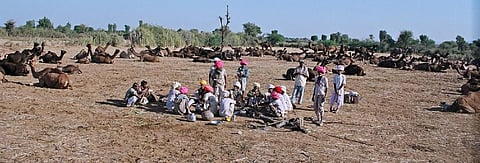

Thousands of pastoralist families from western Rajasthan, who begin their journey to Haryana and Punjab during the summer, were severely impacted by the nationwide lockdown, put in place to curb the spread of the novel coronavirus disease (COVID-19).
The pastoralist community has been forced to suspend travel till the lockdown is phased out, causing an extreme fodder crisis in several villages. Those who had begun to migrate to other states with their herds, are now stuck and exposed to a precarious environment where food and water is scarce.
Pastoralists belong to some of the most marginalised communities, with several families lacking the finances to purchase fodder from open markets. As the summer peaks, the lockdown will result in pastoralists missing opportunities to use green grass as fodder, before the kharif season, on their pastoral routes.
Mool Singh, a pastoralist from Nakrasar village in Rajasthan’s Bikaner district, migrates in March every year with his herd. This year, however, he said he was not sure if he will manage to procure fodder.
“I do not know what would happen if the lockdown is extended. I have fodder only for the next few days,” he said.
Locals who do not migrate with their livestock are worried their existing water and forage resources in villages will be stressed by feeding a phenomenally large number of animals.
With restrictions on travel imposed, pastoralists are not able to avail the veterinary care services for their animals either, as they are unable to travel to the nearest facility with their animals and cannot request healthcare workers to visit them.
The trading of livestock — including sheep and goats — a primary source of income for the pastoralists, was also affected after consumers became sceptical of eating meat after false rumours of the disease being contracted this way, spread.
Pastoralists believe these rumours will have a long-term impact on the demand for these products. With such a large population of pastoralists migrating from the five districts of Bikaner, Churu, Jaisalmer, Jodhpur and Nagaur having ready access to markets in Punjab and Haryana, this livelihood avenue is now closed.
Pastoralists need forage support, said Rewant Ram, a social activist leading efforts to revive traditional pasture routes in arid areas across Rajasthan.
“We have already witnessed a 40 per cent decline in the prices of cow milk since the imposition of the lockdown. This pandemic is going to prove to be catastrophic for their animals and families,” he said.
Ashaq Khan, a pastoralist from Motasar village in Bikaner district, who has a family of five, said he earned very little by transporting goods on his camel cart.